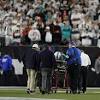What are the new Covid self-isolation rules and when do they come into effect?


he self-isolation period for fully vaccinated people who have Covid has been cut to a week, allowing thousands of Britons to socialise over Christmas.
Health Secretary Sajid Javid said the change in rules was “sensible” and would help to ease staffing shortages in the NHS.
But what are the new self-isolation rules, and how long can you expect to stay in quarantine?
What are the new rules?
Under the new rules, Britons must take a lateral flow test on day six and seven of their period of self-isolation.
If both results are negative, you can leave on day seven — eliminating the extra three days of quarantine.
What were the old self-isolation rules?
Under previous rules, Britons were ordered to take a test whenever they had one of the three typical Covid symptoms: a high temperature, a continuous cough or a loss of taste or smell.
Those who test positive on a rapid lateral flow test were ordered to follow up with a PCR test and had to self-isolate unless they received a negative result.
For those who had symptoms, the period of self-isolation lasted 10 days from when those symptoms began.
Anyone who is not symptomatic — which is about a third of all Covid patients — must isolate from the day that they took their PCR test.
Why have the changes been brought in?
According to NHS data, staff absences at NHS acute trusts due to Covid or self-isolation increased by 18 per cent from 11,375 on November 29 to 13,468 on December 9.
The picture looks bleak across London, where Omicron cases continue to rise. On December 12, staff absences had risen by 31 per cent from the start of the month to 1,540 from 1,174.
NHS providers say hospital trusts in the capital saw a rise of 140 per cent in staff absences between December 12 and 16.
The rule change could also help thousands of people see their families in time for Christmas.
Those who tested positive a week before Christmas will now be reunited with their loved ones over the festive period — provided they receive a negative result.
What has Sajid Javid said?
Health Secretary Sajid Javid noted ministers “want to reduce the disruption from Covid-19 to people’s everyday lives”.
He told the BBC: “It’s vital people keep playing their part by testing regularly and isolating if they test positive.
“And I urge you to get boosted now to protect yourself and those around you.
“I think this is a very sensible, balanced and proportionate take. It is great that when people do get infected that they are properly isolating, I think that clearly helps prevent infection.”


 United Kingdom
United Kingdom Argentina
Argentina  Australia
Australia  Austria
Austria  Brazil
Brazil  Canada
Canada  Germany
Germany  Ireland
Ireland  Italy
Italy  Malaysia
Malaysia  Mexico
Mexico  New Zealand
New Zealand  Poland
Poland  South Africa
South Africa  United States
United States 

























